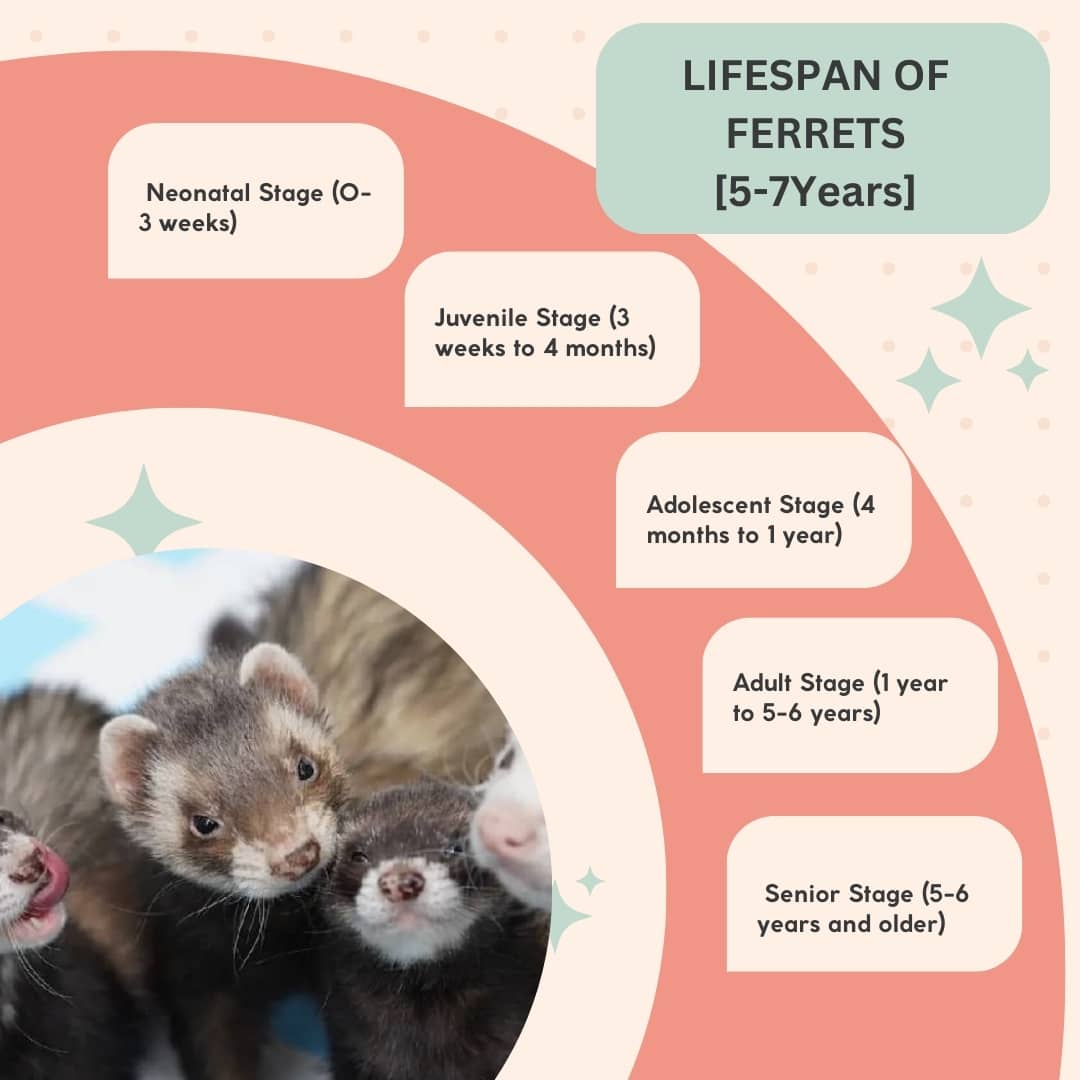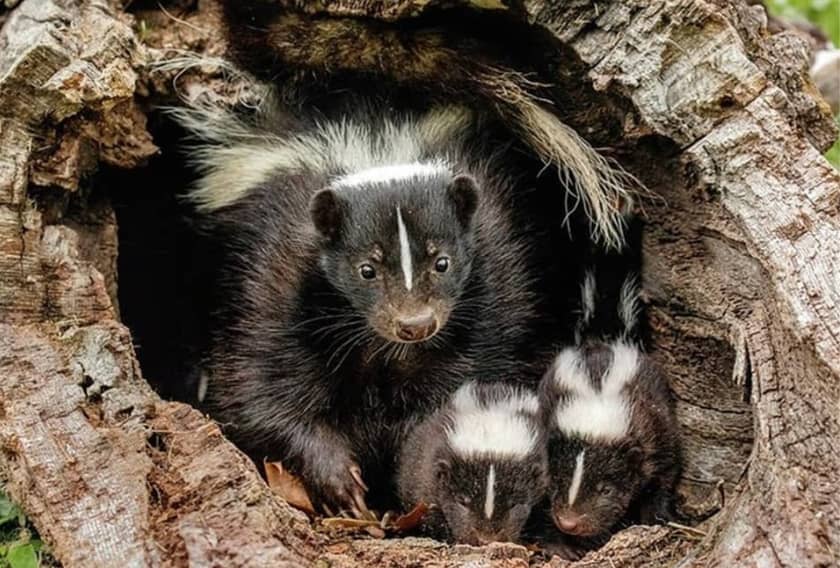Ferret is a fascinating creature from the weasel family that has charmed their way into the hearts of many pet enthusiasts. This domestic ferret should not be mistaken for a wild species, the footed Ferret ( Mustela Nigripes).
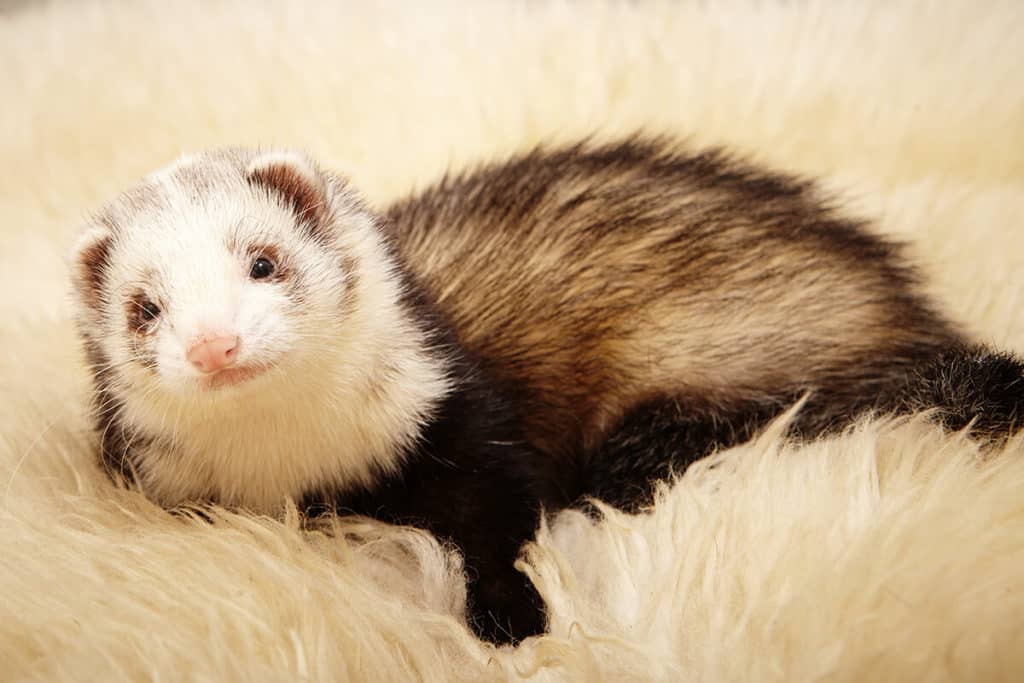
A member of the Mustelidae family, domestic ferrets (Mustela putorius furo) are tiny, predatory animals. The name “ferret” is derived from the Latin word furittus, meaning “little thief.” So, Mustela (putorius) furo, literally means “the (stinky) weasel thief.” This name likely refers to a habit of secreting small items
They were first domesticated to hunt rabbits and rats over 2,500 years ago. The sailors used to take them along on voyages to hunt rats on ships. Moreover, they were bred for sports activities as well. They are currently well-liked pets that are well-known for being lively and curious.
These cute creatures come in black, brown, sable, cinnamon, chocolate, white, or a mixture of these colors.
Ferrets are not nocturnal, but crepuscular meaning they are more active at dawn or dusk. They generally sleep for more than 20 hours a day and love to play actively when awake.
Size Information
Ferrets have long, slender bodies with a body length of about 50 cm, (20”) including a 13cm (5.1”) long tail. These small mammals weigh around 0.7-2.0 Kg (1.5 to 4.4lb).
Lifespan of Ferrets
The lifespan of ferrets depends on genetics, diet, activity level, and care. They live for an average of 5 to 7 years, however, the oldest ferret on record is 14 years. With optimum care, their life expectancy can be 10 years. The complete lifecycle of ferrets can be understood in five stages.
Neonatal Stage (0–3 Weeks)
Features: Kits, or newborn ferrets, are toothless, blind, and deaf. Their mother is their only source of warmth and food.
Care: Jill, the mother ferret, should give the animal all the attention it needs during this phase. Minimal human assistance is necessary to prevent stress.
Juvenile Stage (Three to Four Months)
Features: Kittens start to wean from their mother’s milk to solid food, open their eyes and ears, and erupt teeth. They are jovial and quite animated.
Care: Feed ferrets a meal high in fat and protein that is appropriate for their developing size. It’s important to socialize them, so treat them gently as they become accustomed to being around people. Make sure they have exciting, safe toys and a safe space to play in.
Adolescent (Four Months to a Year)
Features: Ferrets may behave more independently and continue to grow quickly. They need lots of stimulus because they are lively and inquisitive.
Care: Continue regular socializing, get lots of exercise, and maintain a balanced diet. Now is an excellent moment to start training and creating habits.
Adult Stage (Between One and Five Years)
Features: Ferrets are endowed with full sexual and physical development. In contrast to their adolescent stage, they may exhibit more relaxed behavior, yet they are still often lively, inquisitive, and fun.
Care: Make sure you eat a steady diet and get frequent checkups. Keep their surroundings engaging by adding toys and activities. It is advised to spay or neuter to avoid health problems and undesired behaviors.
Senior Stage (Ages Five to Six)
Features: Ferrets may begin to slow down and exhibit indications of aging, such as altered weight, decreased energy, or health problems including dental decay or adrenal disease.
Care: Modify their diet to meet their evolving dietary requirements. Make sure there’s softer bedding and easy access to water and food. Frequent veterinary appointments are essential for managing health complications connected to aging.
Male Vs. Female Ferrets
Male Ferrets (Hobs):
Typically larger, weighing between 2 to 4 pounds, and more muscular. The males have a rounder head. Hobs tend to have a more laid-back demeanor but can be territorial and aggressive especially when un-neutered. A neutered male is called, a gib. They have a stronger musky smell as compared to their female counterparts.
Female Ferrets (Jills):
Smaller, weighing between 1 to 2.5 pounds, and more agile. Jills are often more active and curious but can be more prone to hormonal changes. The spayed female is called, a sprite.
The ferrets under one year are kits and a group of ferrets is known as “business”.
Behavior and Temperament
Ferrets are known for their playful, energetic, and curious nature. They are social animals that thrive on interaction with their owners and other ferrets. Therefore when you are adopting ferrets, adopt more than one. They can form strong bonds with humans and enjoy exploring their surroundings.
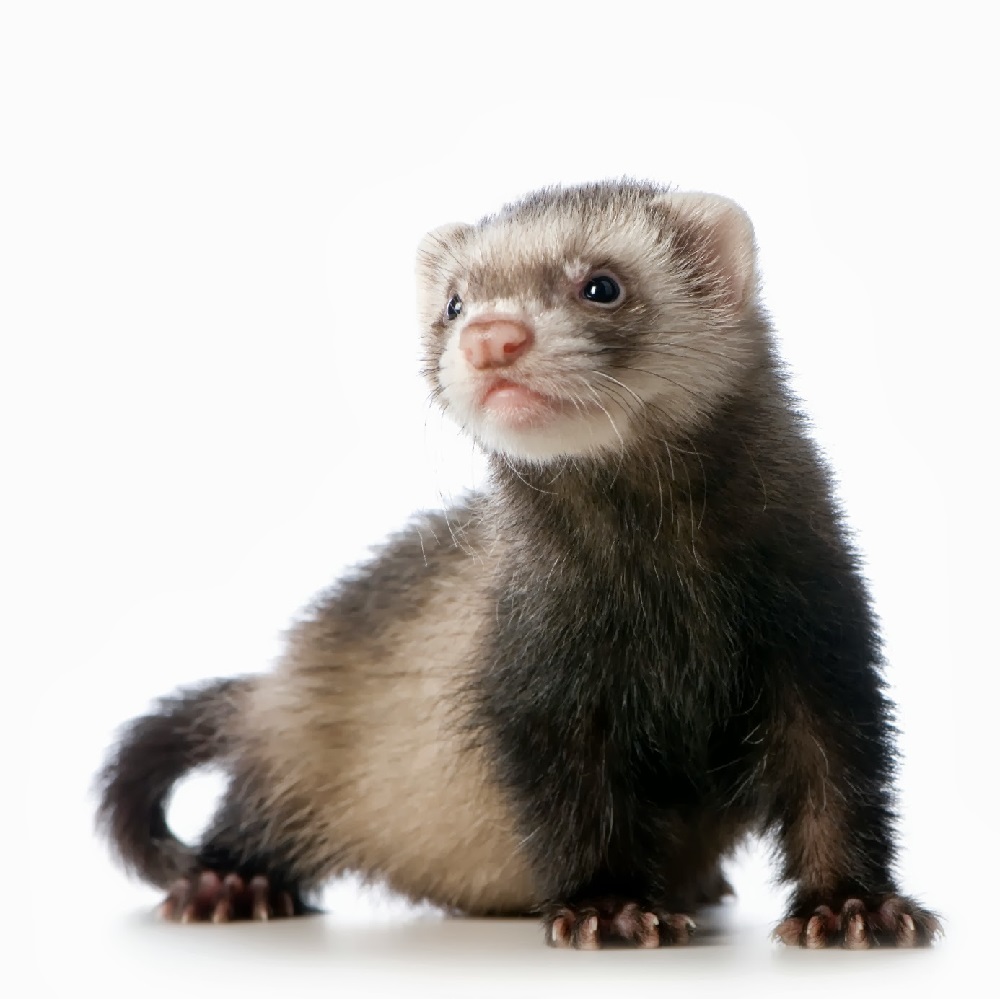
They like to collect ”toys” out of your things (rubber balls, little fluffy stuffed animals, socks, shoes, insoles, and stuff like that and make a nest to sleep in. You should give them at least two hours of playtime outside their cage.
At times they play rough and tend to nip but you can avoid it through nip training beginning at a young age. Moreover, they love to cuddle if you teach them as babies it’s safe and good to do so. But they need companionship to feel safe in their home and another ferret always helps. Ferrets also have an instinct to burrow and hide, which can sometimes lead to mischievous behavior.
These animals use a variety of vocalizations such as hissing and squeaking. Like skunks, ferrets can release anal gland secretions under stress but smell is much less potent and dissipates rapidly.
As ferrets have hunting instincts they should not be housed with small pets such as rabbits, guinea pigs, hamsters, or rats. A dog with hunting instincts can be a threat to your pet ferret. However, with some breeds of dogs and cats, ferrets develop bonding when introduced to each other at a younger age.
How to Care for a Pet Ferret?
They require specific care and understanding to thrive in a domestic environment. Ferrets should get a cage to mimic its natural environment full of enrichment activities, proper diet, gentle handling, and timely grooming.
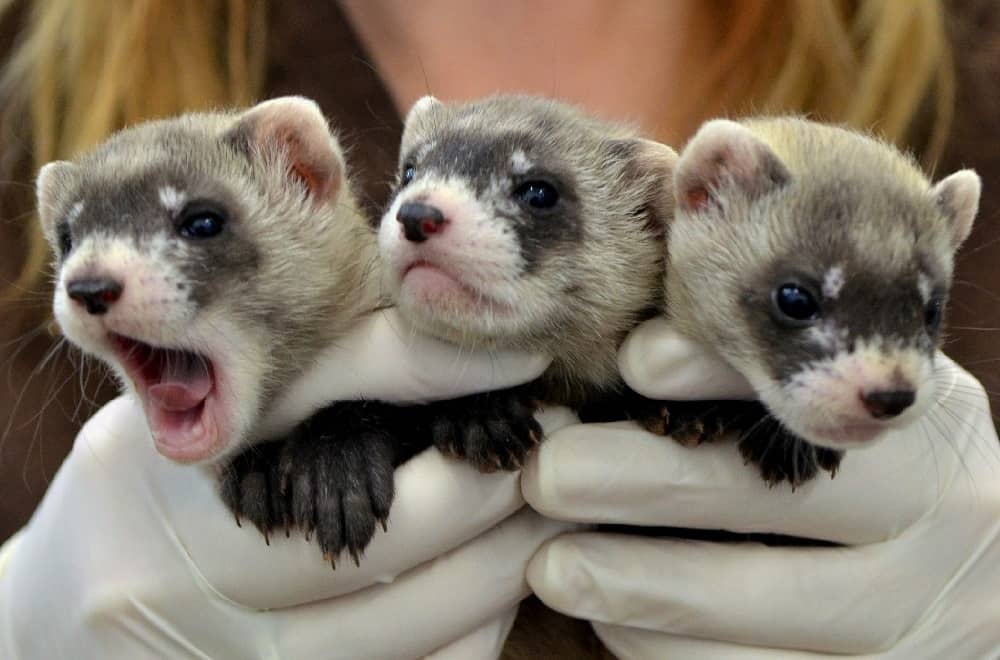
Ferret’s Cage
Ferrets require a spacious cage with multiple levels, sloping ramps, and hiding spots. The minimum size can be 18” x 18”x 30”, the bigger the better.
The cage should be large enough for them to move around freely and include a sleeping area, litter box, and play area. Ferrets are sensitive to heat and humidity as they lack sweat glands. They do well in the temperature range of 65 -75 degrees Fahrenheit(18 to 23 degrees Celsius) hence their enclosure should not be kept in direct sunlight. Moreover, the cage should be well-ventilated.
It’s essential to ferret-proof your home, as they are known for their ability to squeeze through small spaces and get into mischief.
Specific Substrate Needs
You should use a safe, dust-free bedding material such as soft hay, recycled paper, or aspen shavings. Avoid cedar and pine shavings, as they can be harmful to ferrets.
Exercise and Toys
Ferrets need plenty of exercise and mental stimulation to stay healthy and happy. You should provide them with toys, tunnels, and opportunities to explore outside their cage under supervision. You can set up a playpen with some DIY enrichment activities made with cardboard boxes, slopes, balls, and other toys. Aim for at least 2 to 4 hours of supervised playtime outside the cage daily.
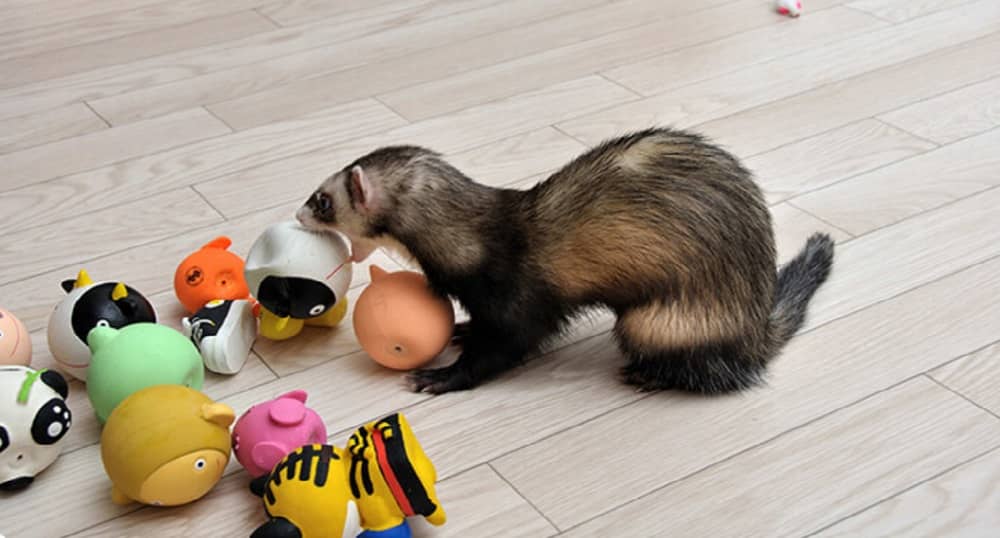
Food and Water Bowl
Ferrets should have access to clean water kept in a ceramic or steel water bowl. A food bowl can be kept in the enclosure.
What Should Ferrets Eat and Drink?
A balanced diet for a ferret includes high-quality commercial ferret food, raw or cooked meat, and occasional treats like eggs or small amounts of liver can keep your ferrets active and agile. Ferrets are obligate carnivores, meaning they require a diet high in animal protein and fat with little or no carbohydrates.
They must always have access to food if they are fed dry food. Ferrets typically just consume food to meet their calorie needs, so just because food is available doesn’t mean they will go overboard. Due to their rapid metabolism and tiny digestive tracts, ferrets need to eat frequently.
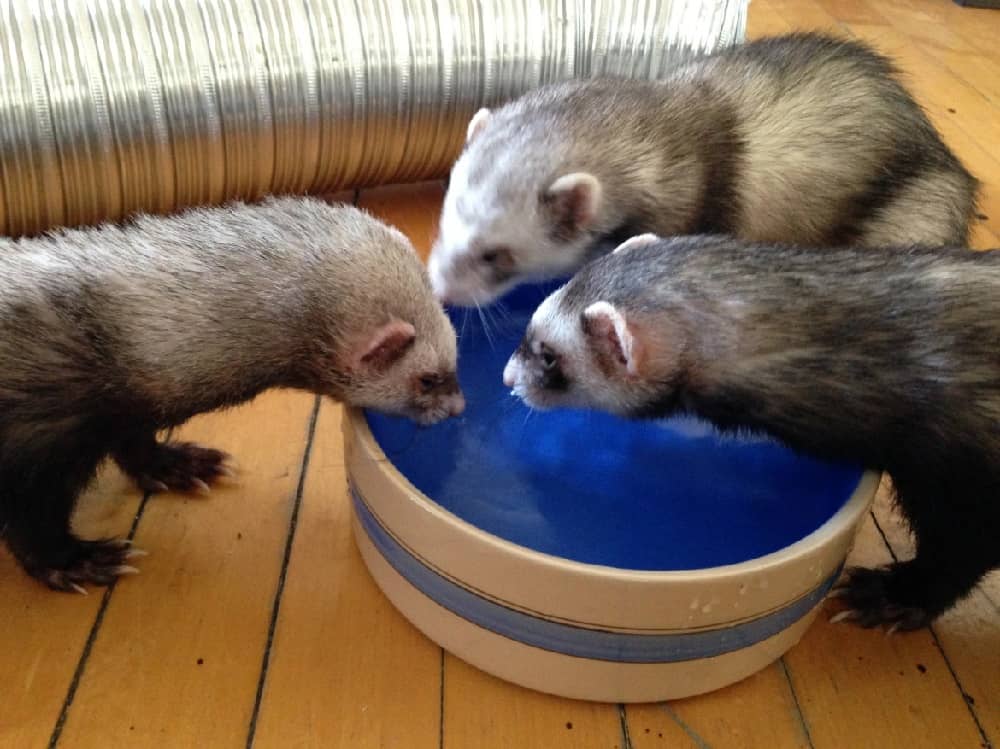
Additionally, ferrets can consume full, natural meals of uncooked prey. Meats, bones, and organs provided in appropriate amounts make up raw diets, often known as frankenprey or prey-model diets. These days, a lot of commercial companies sell balanced raw meals in pet stores; these can be a fantastic complement to a raw feeding regimen.
They can also be given frozen mice or chicken, raw or cooked eggs. Ferrets should be fed kibble mix during the initial year to develop their taste for it. You should not feed “dog food” to your ferret as it lacks protein.
What Ferrets Should Not Eat?
Ferrets shouldn’t consume sugar-containing foods or cereals, peanut butter, wheat, rice, corn, carbs, raisins, bananas, dairy products, chocolate, or other sweets.
Carbohydrate-rich diets can cause intestinal issues and some types of cancer. Vegetable protein is poorly digested therefore you should avoid feeding them fruits, vegetables, or grains.
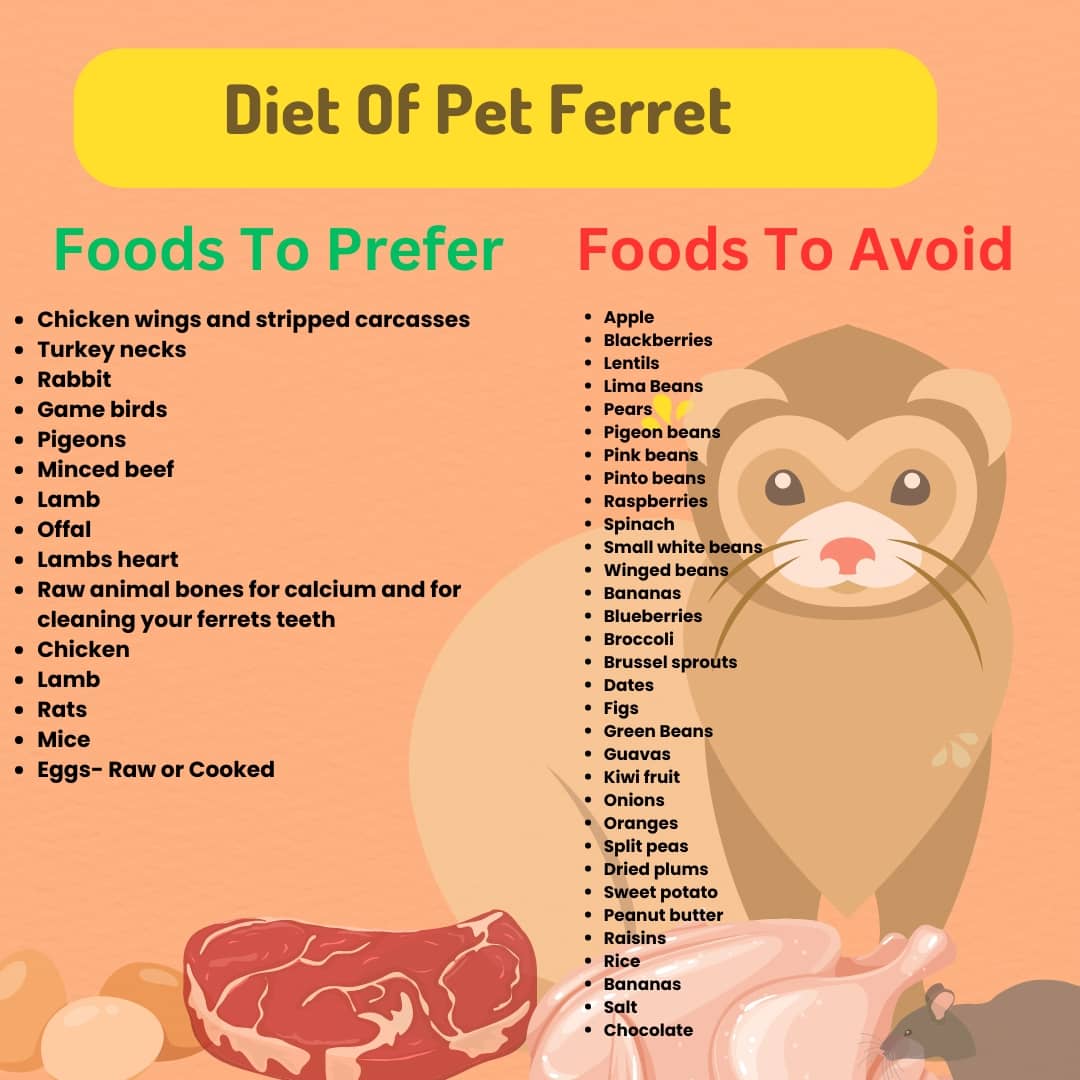
How to Handle Ferrets?
Ferrets enjoy being handled and can be very affectionate with their owners. They are fragile and can be injured if they slip from the owner’s hands therefore handling them gently and supporting their body is important. You should start handling them at a young age to help them get accustomed to human interaction and keep it more often.
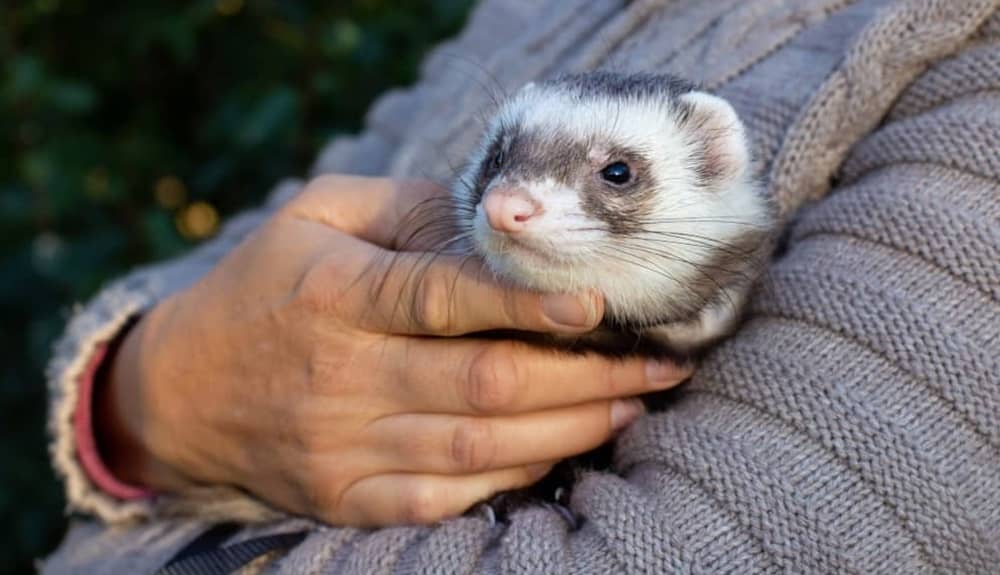
With your other hand, softly and firmly hold its hind legs as you grasp it around the shoulders under the front legs with your thumb under its chin.
Related Species
Ferrets belong to the Mustelidae family, which includes other animals like weasels, otters, and mink. The close relatives are
- The European polecat
- Siberian Polecat
- Black Footed Ferret
Health Issues
Ferrets are prone to certain health problems, including:
- Diarrhea: They can have diarrhea either due to abrupt changes in diet, intestinal parasites, bacterial infection, or Inflammatory Bowel Disease (IBD). The symptoms may be anorexia(rejection of food, vomiting, weight loss, and weakness.
- Adrenal Disease: A common condition affecting the adrenal glands, leading to hormonal imbalances. Hair loss, muscular atrophy, urinary obstruction in males, and enlarged vulva in females are symptoms of an adrenal gland disease.
- Insulinoma: A tumor in the pancreas that causes low blood sugar levels due to over-secretions of insulin
- Intestinal Foreign bodies: Ferrets can chew upon shoe inserts, earplugs, balloons, rubber bands, erasers, kids’ toys, pet toys, speaker foam, and headphone foam. This can obstruct its intestine.
- Heart Disease: They can develop heart failure due to heartworm infection. They should be on monthly heartworm prevention.
- Dental Issues: Tartar buildup and gum disease are common in ferrets.
Where to Buy
A ferret can be adopted from a shelter, purchased from Petco, or bought from a private breeder. It is better to own a baby ferret that can be trained for human interaction, cuddling, and handling.
Cost of Ferrets
It’s important to do thorough research and ensure the source is responsible and ethical. The cost of a ferret can be approximately between $100-$500.
Upkeep Cost
The cost of keeping a ferret includes initial expenses for the cage, bedding, food, and toys, as well as ongoing costs for food, veterinary care, and other supplies such as a nest box, litter box, food, and water bowl. On average, expect to spend $100 to $500 monthly for their care.
Grooming
Ferrets are naturally clean animals and require basic grooming to keep their coat and nails in good condition.
- Removal of Loose hair: Brush their coat weekly to remove loose fur and prevent matting.
- Nail Trimming: Trim their nails every few weeks to avoid overgrowth and discomfort.
- Bathing: Bathing too frequently might deplete the skin of its natural oils, so use it sparingly.
- Teeth Brushing: A veterinarian should check them for tartar accumulation and clean them regularly.
- Ear cleaning: The ear should be checked for wax build-up or mites.
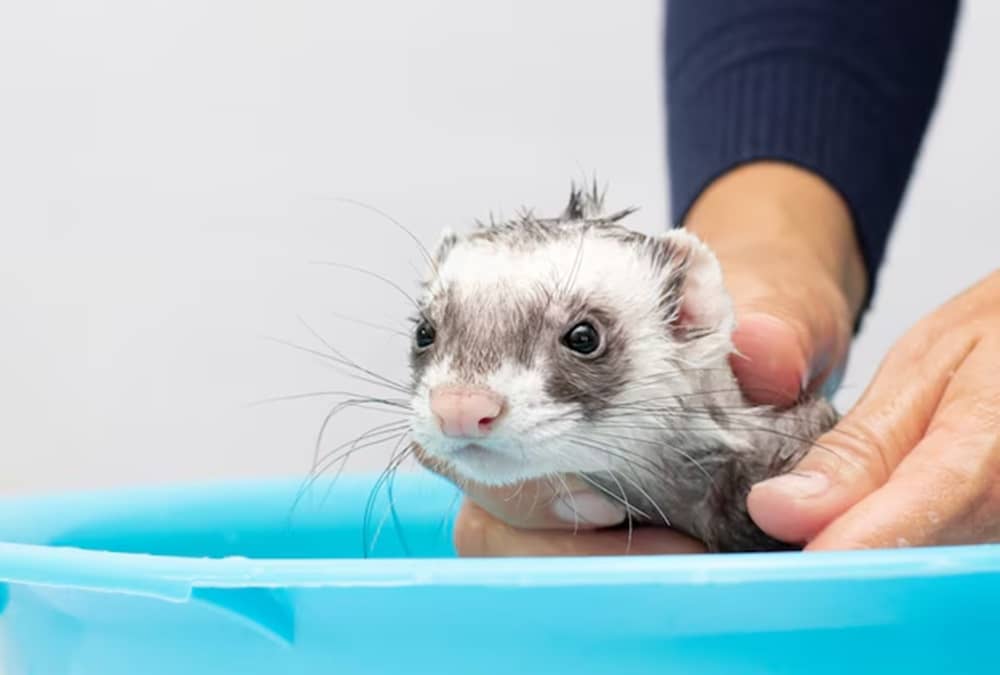
Ethics and Legality
It’s important to check local laws before deciding to keep a ferret because owning one is prohibited in some US states and towns. States like California and Hawaii, for example, prohibit ferret ownership due to concerns about them becoming invasive species if they escape into the wild.
However, in some states such as Florida, Georgia, Idaho Colorado, and more, there are some minor regulations for owning a ferret.
Pros and Cons of Keeping a Ferret as a Pet
Pros:
Playful and entertaining: Ferrets are cute, loving, and adorable. They love playing with other ferrets and with the owners. They can lift up your mood with their antics.
Strong bonding: They are affectionate and love cuddling when handled gently. They make strong bonds with their owners.
Easy to handle: It is easy to handle, lift, and care for ferrets due to their small size and lightweight. It is also easier to set up its multilevel enclosure with provision for different activities.
Litter Box Training: They quickly learn to use a litter box with a little bit of litter training.
Cons:
Require a lot of attention and interaction: Ferrets need an ample amount of time outside the cage and that needs a lot of attention.
Specific health issues: Both rabies and other bacterial illnesses are thought to be carried by them.
Can be mischievous and get into trouble: Due to their inquisitive nature, they tend to explore every corner of your house. As their spine is flexible, they tend to enter small openings, but it can put them in a difficult situation. For the safety of the ferrets, the play space has to be made ferret-proof and supervised.
May have an odor: Ferrets have a mild musky odor which all may not like.
Relation with other pets: Ferrets can attack small pets such as hamsters, guinea pigs, and rats. Moreover, they can be attacked by a ferocious dog. However, you can expect a healthy and friendly relationship with some breeds of dogs.
Litter box cleaning: Like cats, ferrets do not bury their poop and hence will not use the litter box again if it is not clean. Therefore you will have to be very pro in keeping its litter box well-maintained all the time.
Some Interesting Facts About Ferrets
- For more than 2,500 years, ferrets have been kept as pets.
- They can sleep up to 18 hours a day.
- Ferrets have a lifespan of 6-10 years. The average lifespan is around 8 years.
- They have a keen sense of smell and hearing.
- Ferrets are known for their “war dance,” a playful, bouncing display. It exhibits frenzied sideways hops, leaps, and bumping into nearby objects.
- In excitement, while dancing, they make a unique, soft, and clucking noise,” Dooking”
- Ferrets tend to play rough often and will nip.
- They can squeeze through very small openings due to their flexible spine.
- Ferrets have a specialized diet and cannot digest plant matter due to their shorter GI tract.
- They are social animals and enjoy the company of other ferrets.
- Ferrets have a natural instinct to burrow and hide.
- It is possible to train them to use a litter box.
- Ferret’s normal heart rate is nearly 200 to 250 beats per minute.
- Ferrets are more active at dawn or dusk.
- All kits are born white color and they take adult color at the age of 3 weeks.
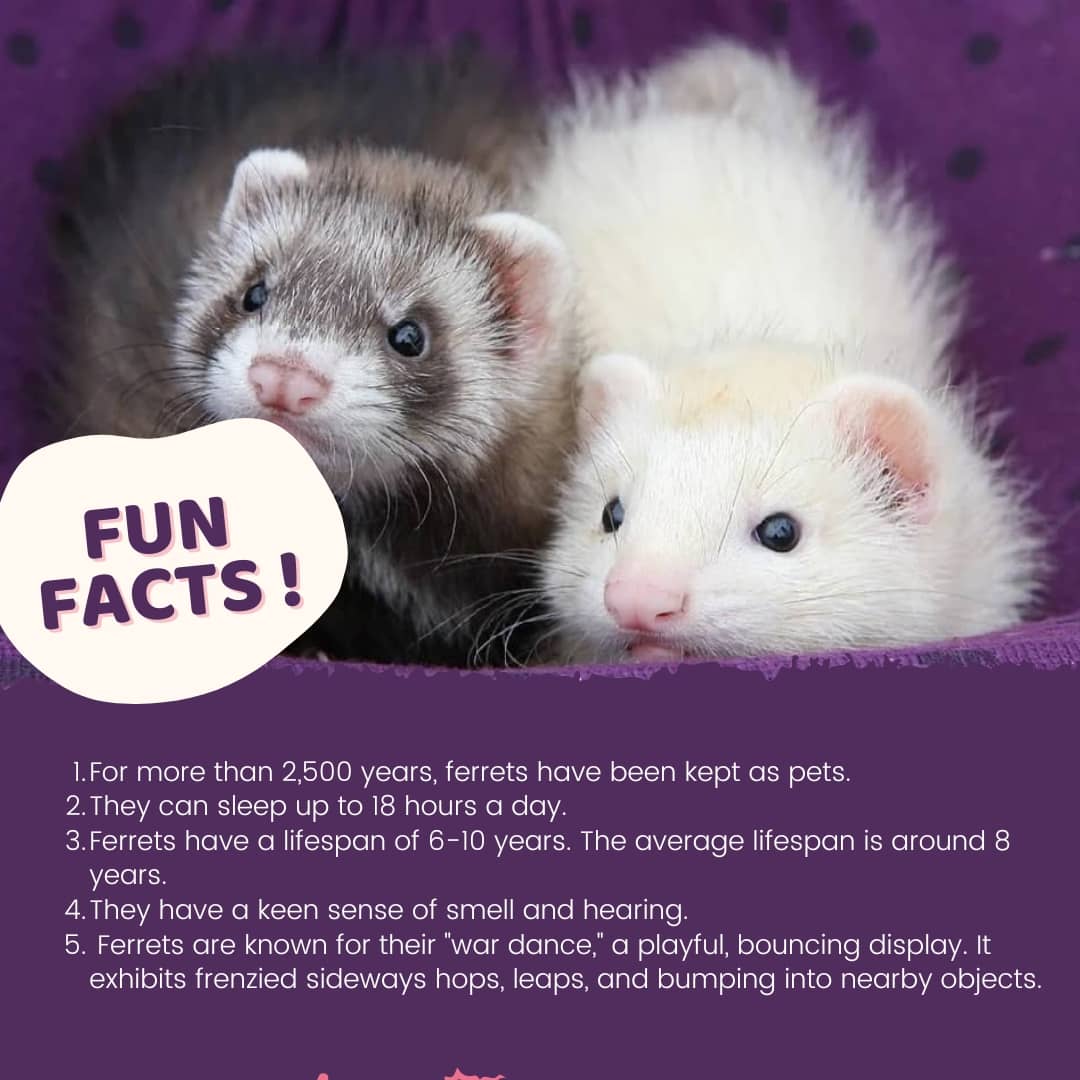
Frequently Asked Questions
Question 1. Do ferrets make good pets for children?
Answer: Ferrets are curious and fun-loving creatures and need a lot of attention so they don’t make good pets for children.
Question 2. Is it legal to own a ferret?
Answer:. It varies by state. You need to check local regulations before acquiring ferrets.
Question 3. Can you litter-train a ferret?
Answer: It’s possible to train a ferret to use a litter box, but it might take some time and effort.
Question 4. Do ferrets bite?
Answer: They can, especially if frightened or provoked. They can injure you if they bite and hold on since they have sharp teeth.
Question 5. Do ferrets have a strong odor?
Answer: Ferrets have a natural musky odor, but regular cleaning and grooming can help minimize it.
Question 6. Do ferrets need vaccinations?
Answer: Yes, rabies and canine distemper vaccinations are recommended for ferrets.
Question 7. Can ferrets be left alone?
Answer: Long stretches of time should not be spent alone with ferrets. They require frequent attention as well as social engagement.
Question 8. Can I bathe my ferrets?
Answer: Yes, ferrets need bathing. You can bathe them with a mild shampoo.
Question 9. Do ferrets get along with other pets?
Answer: Though there are a few exceptions, most ferrets don’t get along with fish, birds, rabbits, rats, lizards, and the like.
Question 10. How much do ferrets cost?
Answer: One can own ferrets for $100 to $500.
Conclusion
In conclusion, ferrets can make delightful and engaging pets for those willing to invest the time and effort required to meet their needs. They offer companionship and endless entertainment but also come with specific challenges and responsibilities. When introducing a ferret into your home, make sure you are ready for the dedication and upkeep that they require.

